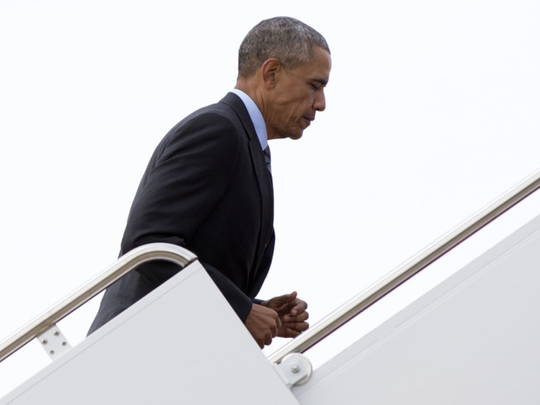
Washington: The US administration sought on Friday to contain fallout from a leaked internal memo critical of its Syria policy, but showed no sign it was willing to consider military strikes against Syrian President Bashar Al Assad’s forces called for in the letter signed by dozens of US diplomats.
Several US officials said that while the White House is prepared to hear the diplomats’ dissenting viewpoint, it is not expected to spur any changes in President Barack Obama’s approach to Syria in his final seven months in office.
One senior official said that the test for whether these proposals for more aggressive action are given high-level consideration will be whether they “fall in line with our contention that there is no military solution to the conflict in Syria.” The document — sent through the State Department’s “dissent channel,” a conduit for voicing contrary opinions meant to be classified — underscored long-standing divisions and frustrations among Obama’s aides over his response to Syria’s five-year-old civil war.
Obama’s Syria policy has been predicated on the goal of avoiding deeper military entanglements in the chaotic Middle East, and has been widely criticised as hesitant and risk-averse. Obama’s limited intervention has focused on fighting the Daesh group that controls a swathe of Syria and Iraq and which has inspired attacks on US soil.
A draft of the cable, signed by 51 State Department officers, calls for “targeted military strikes” against Al Assad’s government — something Obama has long opposed — to stop its persistent violations of a ceasefire with US-backed antigovernment rebels that is largely ignored by Syria and its Russian supporters.
Obama’s critics quickly seized upon the letter, which also calls for a political transition that would usher out Al Assad.
“Even President Obama’s own State Department believes the administration’s Syria policy is failing,” said Ed Royce, Republican chairman of the House of Representatives Foreign Affairs committee.
“Iran, Russia and Al Assad call the shots in Syria, ignoring the ceasefire and allowing Al Assad to continue war crimes against his own people.”
In what other officials called an attempt to limit any damage to the president’s policies, one senior US official, speaking on condition of anonymity, stressed that it is only natural that “on a subject as complex and complicated as Syria that we have a diversity of views.”
White House spokeswoman Jen Friedman said Obama is open to a “robust discussion” on Syria but she insisted that deliberations by Obama’s national security team have already taken a very close look at a range of options.
A former senior US official said the unauthorised disclosure of a confidential cable of this type “corrodes the trust between the president and those who serve him.” But those who leaked the memo may have been looking past Obama’s tenure. Presumptive Democratic nominee Hillary Clinton, for instance, was among senior aides who urged Obama early in the Syrian conflict to take a stronger stand militarily against Al Assad.
Other US officials pointed out that the cable does not carry the signatures of any senior State Department officials, such as assistant or deputy secretaries or ambassadors.
Secretary of State John Kerry, visiting Copenhagen, said: “It’s an important statement and I respect the process, very, very much. I will ... have a chance to meet with people when I get back (to Washington).” Kerry has himself pressed with little success for Obama to take tougher action against Al Assad.
The senior official said that since the letter was directed to Kerry, he would deal with it for now, and it would be up to him whether to “elevate it” to Obama’s attention.
The internal dissent has been brewing at least since August 2013, when Obama stunned Kerry, then-Defence Secretary Chuck Hagel and other senior aides by abruptly calling off air strikes he had vowed to order if Al Assad’s forces crossed a “red line” against the use of chemical weapons. Nine days earlier, a Sarin gas attack killed as many as 1,400 Syrians.
“That decision destroyed any credibility the administration had with Russia, Iran or Al Assad himself,” said a former Defence Department official involved in Syria policy.
One US official, who did not sign the cable but has read it, told Reuters the White House remains opposed to deeper American military involvement in Syria’s civil war.
The official said the cable was unlikely to alter that, or shift Obama’s focus on Daesh.
Aides also have acknowledged privately that even if Obama did decide to take a more aggressive stance against Al Assad, that would be much riskier now that Russian forces are directly supporting their Syrian ally and bombing antigovernment rebels.
US strikes could put Washington on a collision course with Moscow. In the meantime, Al Assad’s position has strengthened.
When asked about the leaked memo during a visit to Washington, Saudi Foreign Minister Adel Jubeir told reporters: “We have been arguing from the beginning of the Syrian crisis that there should be more robust intervention in Syria.” Emile Hokayem, senior fellow at the International Institute for Strategic Studies, said the White House has put too much faith in a Syria diplomatic process that he called a “sideshow.”
“The White House looks down on critics of its Syria policy,” he added.












